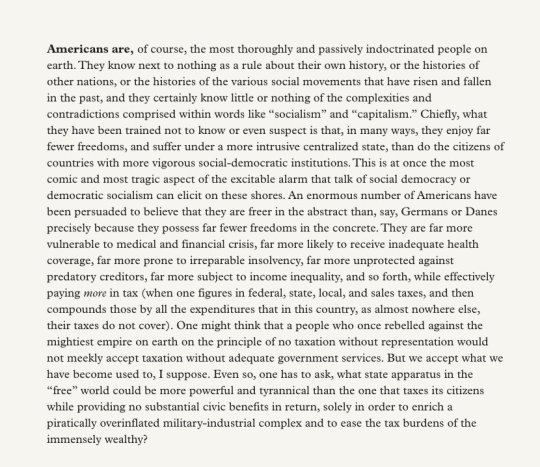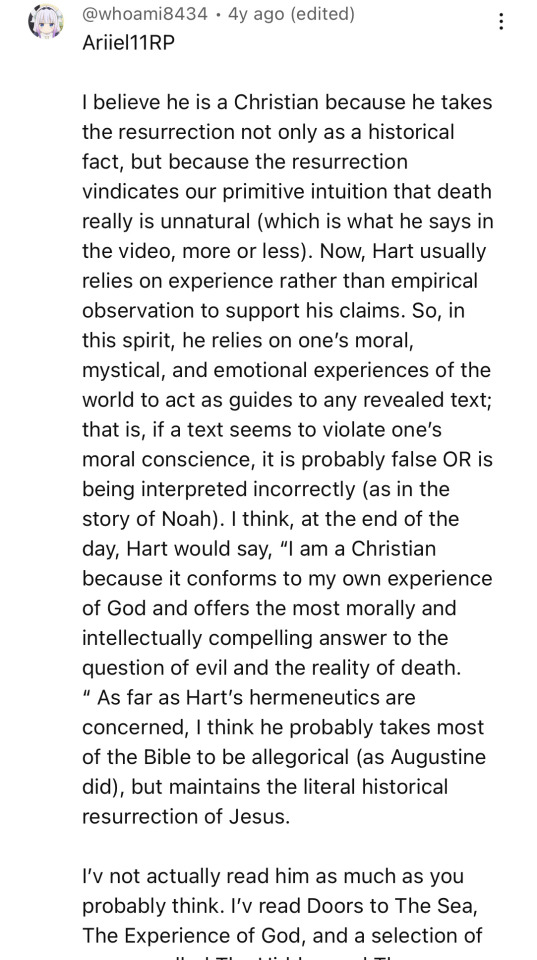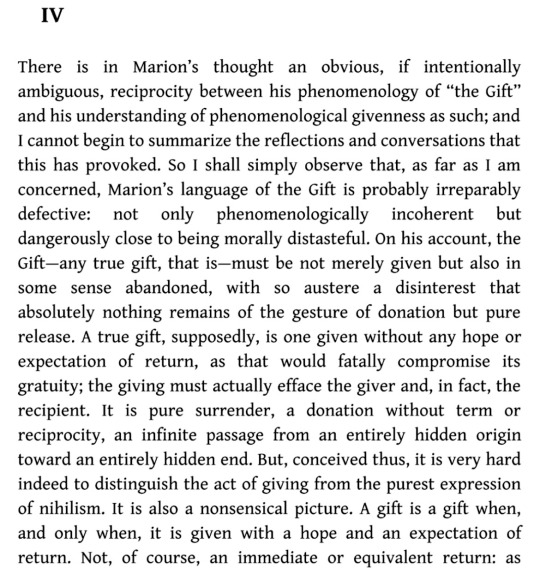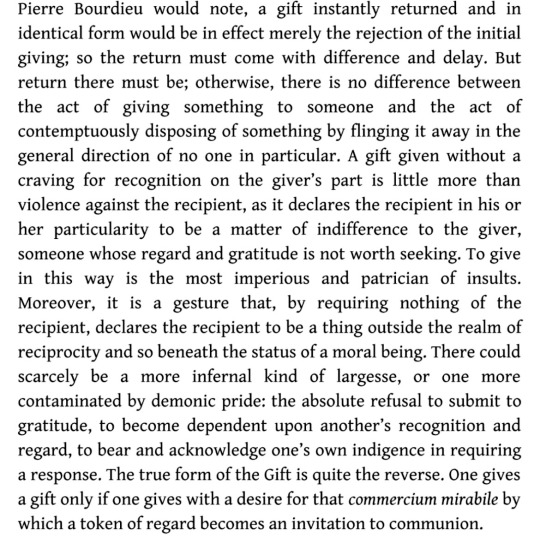#david bentley hart
Link
Capitalism might be said to have achieved its most perfect expression in the rise of the commercial corporation with limited liability, an institution that allows the game to be played in abstraction even from whether the businesses invested in ultimately succeed or fail. (One can profit just as much from the destruction of livelihoods as from their creation.) Such a corporation is a truly insidious entity: Before the law, it enjoys the status of a legal person – a legal privilege formerly granted only to “corporate” associations recognized as providing public goods, such as universities or monasteries – but under the law it is required to behave as the most despicable person imaginable. Almost everywhere in the capitalist world (in America, for instance, since the 1919 decision in Dodge v. Ford), a corporation of this sort is required to seek no end other than maximum gains for its shareholders; it is forbidden to allow any other consideration – say, a calculation of what constitutes decent or indecent profits, the welfare of laborers, charitable causes that might divert profits, or what have you – to hinder it in this pursuit.
The corporation is thus morally bound to amorality. And this whole system, obviously, not only allows for, but positively depends upon, immense concentrations of private capital and dispositive discretion over its use as unencumbered by regulations as possible. It also allows for the exploitation of material and human resources on an unprecedentedly massive scale. And, inevitably, it eventuates in a culture of consumerism, because it must cultivate a social habit of consumption extravagantly in excess of mere natural need or even (arguably) natural want. It is not enough to satisfy natural desires; a capitalist culture must ceaselessly seek to fabricate new desires, through appeals to what 1 John calls “the lust of the eyes.”
The very least that one must concede is that capitalism “works.” That is, it produces enormous wealth, and adapts itself with remarkable plasticity to even the most abrupt changes of cultural and material circumstances. When it has faltered, here or there, it has evolved new mechanisms for preventing the same mistake from being made again. It does not bring about a just distribution of wealth, of course; nor could it. A capitalist society not only tolerates, but positively requires, the existence of a pauper class, not only as a reserve of labor value, but also because capitalism relies on a stable credit economy, and a credit economy requires a certain supply of perennial debtors whose poverty – through predatory lending and interest practices – can be converted into capital for their creditors. The perpetual insolvency of the working poor and lower-middle class is an inexhaustible font of profits for the institutions upon which the investment class depends.
One can also concede that, now and then, the immense returns reaped by the few can redound to the benefit of the many; but there is no fixed rule to that effect, and generally quite the opposite is the case. Capitalism can create and enrich or destroy and impoverish, as prudence warrants; it can encourage liberty and equity or abet tyranny and injustice, as necessity dictates. It has no natural attachment to the institutions of democratic or liberal freedom. It has no moral nature at all. It is a system that cannot be abused, but only practiced with greater or lesser efficiency. But, of course, viewed from any intelligible moral perspective, that which is beyond the distinction between good and evil is, in its essence, evil.
For all these reasons, it seems wise to me that we have elected to ask ourselves not what comes after capitalism, but rather what lies beyond it. As far as I can see, what comes after capitalism – that is, what follows from it in the natural course of things – is nothing. This is not because I believe that the triumph of the bourgeois corporatist market state constitutes the “end of history,” the final rational result of some inexorable material dialectic. Much less do I imagine that the logic of capitalism has won the future and that its reign is destined to be perpetual. In fact, I suspect that it is, in the long run, an unsustainable system.
164 notes
·
View notes
Text

Matthew, chapter 14. (In the translation by David Bentley Hart.)
6 notes
·
View notes
Text
It can be painful - sometimes abhorrent - to us to admit this, but the character of even the very worst among us is in part the product of external contingencies, and somewhere in the history of every soul there are moments when a better way was missed by mischance, or by malign interventions from without, or by disorders of the mind within, rather than by any intentional perversity on the soul's own part.
David Bentley Hart, That All Shall Be Saved
57 notes
·
View notes
Text
“I take it, moreover, to be an obvious truth, if a paradoxical one, that all ‘moral art’ is inevitably bad, yet that all bad art is somehow deeply immoral. There is in a sense more holiness in an elegant blasphemy than in a clumsy pious platitude.
— David Bentley Hart, A Sense of Style, Theological Territories, 2020.
8 notes
·
View notes
Text
Hamannian Hermeneutics: The Marriage of Reason & Faith (or: ‘the Letter & the Spirit’)
The Birth of the Milky Way (1636–1638) by Peter Paul Rubens
“Reason is the source of all truth and of all errors. It is the tree of knowledge of good and evil. Therefore, both parties are right and wrong which deify it and which vilify it. Faith, likewise, is the source of unbelief and of superstition. ‘Out of the same mouth proceed blessing and cursing’”—J. G. Hamann, 1787
Intuition, in the…

View On WordPress
#aesthetics#anglican#atheism#carl jung#catholic#christianity#cognition#david bentley hart#david hume#dialectics#enlightenment#epistemology#ernst junger#esoteric christianity#esoteric philosophy#german idealism#german philosophy#gnosticism#greek philosophy#hegel#heretical#heterodox#heuristics#historiography#immanuel kant#islam#Jesus Christ#johann georg hamann#kantbot#kierkegaard
5 notes
·
View notes
Text
"But here I can at least point out that scripture seems to support my view [against the idea that eternal hell is God respecting human freedom]. ''And you will know the truth, and the truth will make you free" (John 8:32): for freedom and truth are one, and not to know the truth is to be enslaved. "Father, forgive them; for they do not know what they are doing" (Luke 23: 34): not seeing the Good, says God to God, they did not freely choose evil, and must be pardoned. "Everyone committing sin is a slave to sin" (John 8:34): and a slave, needless to say, is not free. Moreover, it is simply obvious that, under normal conditions, we recognize any self-destructive impulse in any person as a form of madness. It makes no more sense, then, to say that God allows creatures to damn themselves out of his love for them or out of his respect for their freedom than to say a father might reasonably allow his deranged child to thrust her face into a fire out of a tender regard for her moral autonomy. And, as absurd as is the idea of someone "in a right mind" choosing eternal loneliness and torment rather than eternal love and bliss, the argument becomes all the more insufferably ludicrous when one considers the personal conditions - ignorance, mortality, defectibility of intellect and will - under which each soul enters the world, and the circumstances - the suffering of all creatures, even the most innocent and delightful of them - with which that world confronts the soul." - DBH
29 notes
·
View notes
Text

David Bentley Hart - Three Cheers for Socialism
10 notes
·
View notes
Text
"Yeah, I would cut off my hand before I'd vote for a damned libertarian."
-David Bentley Hart, universalist theologian and Christian socialist
3 notes
·
View notes
Text
David Bentley Hart’s rebuke of transhumanism is masterful, please read it. The contrast of transhumanist ethics with Orthodox theology truly highlights the obscenity of the former and the beauty of the latter.
3 notes
·
View notes
Text

"experience" and "empirical observation" aren't exactly synonymous, though contrasting them is a bit odd but otherwise I've thought of the same things this commenter with a Kanna avatar has before.
Hart can be nasty and I understand if someone doesn't want to wade through his ad hominem attacks and verbal pyrotechnics(?) but I think there's substance in what I've read of him.
2 notes
·
View notes
Text
David Bentley Hart on David Jones.
8 notes
·
View notes
Text
“If nothing else, mental intentionality—in the full philosophical sense not only of determinations of the will but of every act of the mind in orienting itself toward specific ends, meanings, aspects of reality, and so on—is clearly a part of nature, and yet one whose structure is irreducibly teleological, and thus entirely contrary to the mechanical picture.”
— David Bentley Hart, Consciousness and Grace, Theological Territories, 2020.
5 notes
·
View notes
Text


David Bentley Hart, "Remarks Made to Jean-Luc Marion regarding Revelation and Givenness" Found in Theological Territories
Hart tells us that Marion replied to this "with great grace and aplomb", but I'm not sure if that reply has been published.
Among other things, some of the issues raised here remind me of the countless internet arguments over psychological egoism that you can find on any message board, ones that used to disturb me a lot. It's been said that only an absolutely emotionless being could act selflessly, but how different would that be from the most impersonal occurrence of cause and effect?
4 notes
·
View notes
Text
“Persons of every age are constrained think and speak within the image of reality they know; but that does not mean that the truths they attempt to enunciate are exhausted by those conceptual forms.”
— David Bentley Hart, Different Idioms, Different Worlds, Theological Territories, 2020.
5 notes
·
View notes
Text
This hedonistic, agnostic, often blasphemous pagan is seriously getting interested in David Bentley Hart. As soon as I finish sone lectures on Philosophy of Mind by the Great Courses, I'm going to be reading Hart's book "The Experience of God."
Who knows? Maybe he'll succeed where others have not and convince me of theism. I have an open mind and open heart.
Gotta love how Hart, this universalist and socialist freethinker, is a member of one of the most conservative religions on the planet (Eastern Orthodoxy) but here we are...
#david bentley hart#religion#spirituality#spiritual journey#agnosticism#agnostic#theism#atheism#christianity#theology#paganism#philosophy#eastern orthodox#orthodoxy#universalism
3 notes
·
View notes
Text
Michael Robbins: [...] Which is to say, if you were a Martian, and you came down to the United States and you wanted to deduce from the statements and behavior of its adherents, without access to the scriptures, what Christianity was, what the gospels taught, I think you would have to conclude that Jesus spent most of his time denouncing homosexuality, insisting on the inviolability of gender, counseling the acquisition of wealth, and railing against immigrants.
Dabid Bentley Hart: You’ve left out guns. It’s a curious thing, of course. Let’s start there, then, rather than with the more metaphysically abstruse issues. So, every age of Christendom has been something of a jarring contradiction to the language of Christianity, as preserved in Scripture and liturgy; but I honestly believe that America uniquely is the land where Christianity went to die, and that the proof that it died here is that it could be so easily supplanted by a completely different religion called “Christianity,” and yet no one noticed the absurdity of it.
Michael Robbins: Frederick Douglass noticed. John Brown noticed.
David Bentley Hart: No, right, I mean right now. I don’t mean that no one ever noticed, or that there are no Christians here. I always get attacked for this—“He’s saying there are no American Christians.” No, there’s no American Christianity. The Christians that are here, the ones who are still practicing actual Christianity, have their Christianity from elsewhere. But I mean what’s native to America, the American religion, to use Harold Bloom’s phrase—and he was actually quite good on that. He didn’t get all of it right, but he was right in recognizing that the American Evangelical religion is simply not the thing called Christianity, either faithfully or unfaithfully, throughout Christian history.
Only God Could Join Us to God — Michael Robbins talks with David Bentley Hart
14 notes
·
View notes